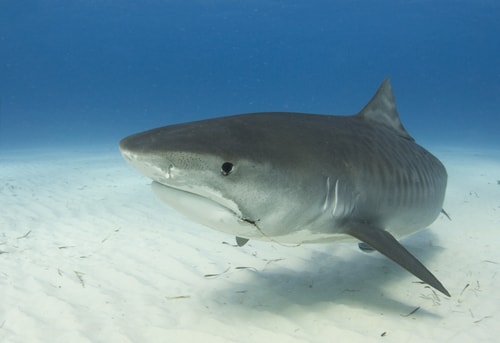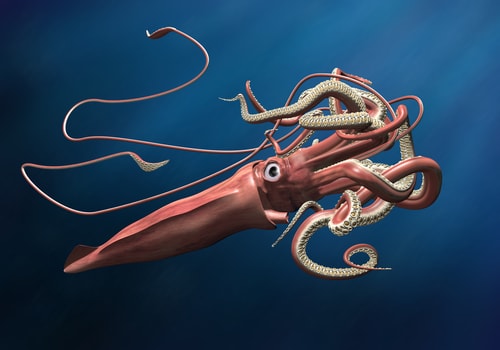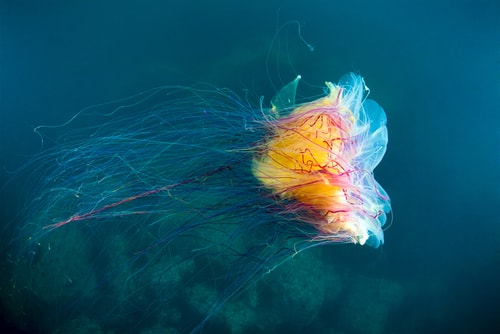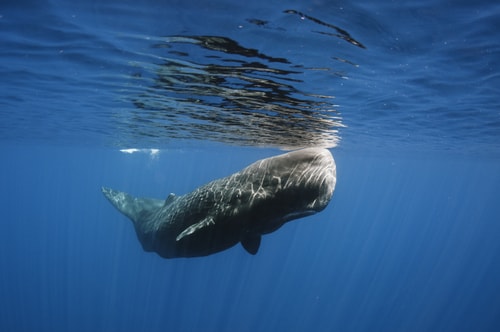7.Tiger Shark

There used to be a myth that these indiscriminate predators could be the cure for cancer. This idea rested on the fact that sharks don't get cancer. In the 1970s, researchers found that cartilage prevented the growth of new vessels in tissue, and these new vessels are one of the key components of cancerous tumors. Because sharks have skeletons made entirely from cartilage, the researchers reasoned that a shark's skeleton would be the best hope for new therapies. This therapy was never proven nor has it been clinically tested in America. But even still, LaneLabs still sells cartilage pills today and the market for shark cartilage was estimated to reach $30 million in 1995. Unfortunately, this has decreased the number of sharks in North America by up to 80 percent, and as it turns out, sharks actually do get cancer.
6.Giant Squid

Giant squids are some of the most mysterious creatures of the sea as well as being the biggest invertebrate on earth. Measuring around 33 feet, the largest giant squid ever found truly was a giant weighing nearly 2,000 pounds and measuring 59 feet in length. Giant squids are elusive in their natural habitats and difficult to study. Most of what we know about them is from deceased squids that have washed up on beaches. It was not until 2004 that the first images of a live giant squid were taken. Giant squids have been found on beaches all over the world but it is still hard to say how far they swim or what their exact habitats are. These humongous squids also have massive eyes because they live so deep in the ocean that they do not see any light. Little is known about the giant squid but it is possible that when given the chance, they will kill and eat small whales, implying that those massive tentacles must be very strong.
5.Lion's Mane Jellyfish

One of the only creatures longer than the imagined giant squid is the lion's mane jellyfish, whose tentacles can reach120 feet long. This is longer than the average body of a blue whale! Their bodies are 95 percent water and they have no bones or blood. They don't even have brains. Yet, jellyfish are some of the longest surviving predators swimming in our seas. Jellyfish have been swimming our oceans for about 650 million years, which is before the dinosaurs even stepped onto the Earth. The lion's mane jellyfish will eat fish and even other jellyfish, and they can do this because despite not having brains, they are very powerful swimmers. Their swimming is what allows them to get away from predators and also to hunt and kill their own food. Unlike other sea creatures, jellyfish do not have teeth. They use their tentacles to poison and paralyze their prey before swallowing it whole.
4.Sperm Whales

Sperm whales are not the biggest whale swimming in the ocean, even at a whopping 35 tons, but that does not stop them from being formidably powerful creatures. Sperm whales are the owners of the largest brains of any creature known on Earth. Sperm whales are impressive swimmers who can dive in excess of 3,000 feet below the surface to find food, and because they are mammals, they have to hold their breath for the whole 90 minute return trip! Sperm whales can be found anywhere in the ocean and prefer meals of squid. Sperm whales hunt squid though a method which involves them flipping upside down in order to create a vacuum which can hoover a squid up from up to three feet away. Many squids are easy pickings for the huge whales and their vacuum mouths, but species like the giant squid are just big enough to fight back. There have been several notable occurrences of sperm whales fighting with giant squids, and some sperm whales have even been found with the marks of a squid's suckers on its body, a testament to the strength of the giant squid.
校对:庄粉玲 编辑:橘子












